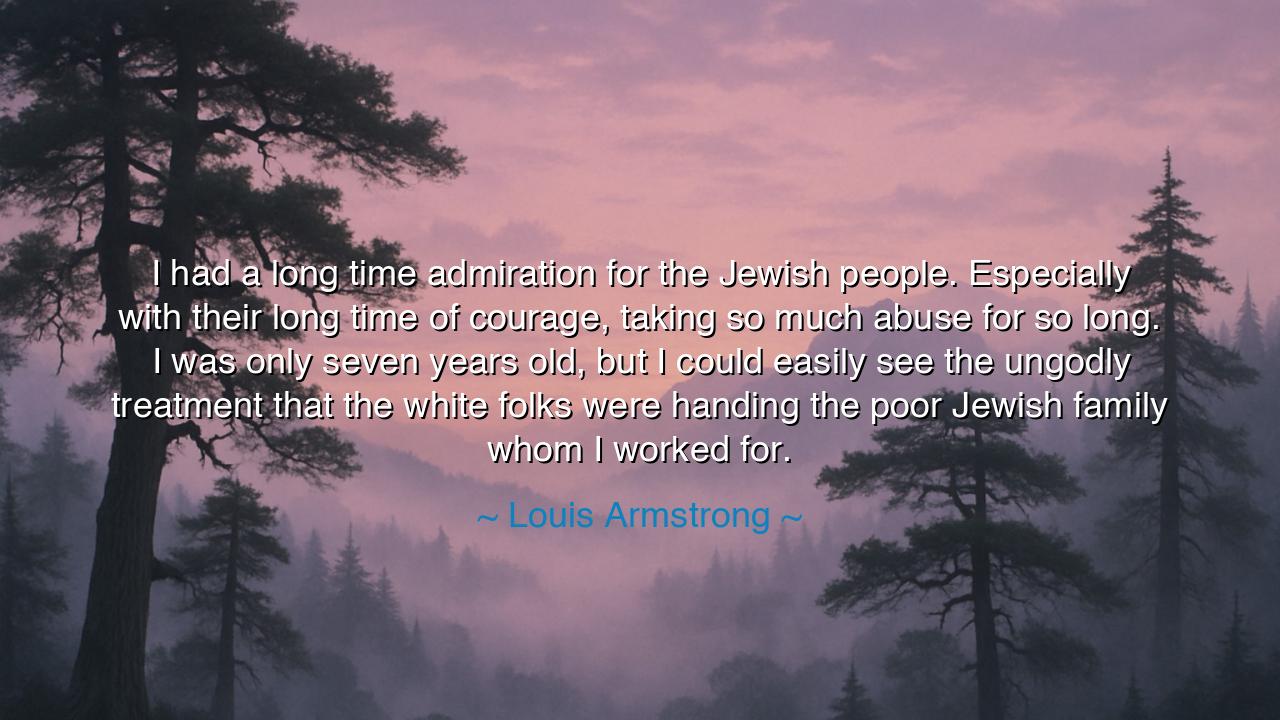
I had a long time admiration for the Jewish people. Especially
I had a long time admiration for the Jewish people. Especially with their long time of courage, taking so much abuse for so long. I was only seven years old, but I could easily see the ungodly treatment that the white folks were handing the poor Jewish family whom I worked for.






There are moments in history when the heart of one great soul recognizes the suffering and nobility of another. Such a moment is captured in the words of Louis Armstrong, the immortal jazz musician and son of hardship, who said: “I had a long time admiration for the Jewish people. Especially with their long time of courage, taking so much abuse for so long. I was only seven years old, but I could easily see the ungodly treatment that the white folks were handing the poor Jewish family whom I worked for.” These words, though spoken plainly, echo like the psalms of old. They reveal the meeting of two peoples—one bound in chains of race, the other in chains of faith—each carrying the mark of suffering, and yet each surviving with courage, music, and faith.
The boy who spoke these words grew up in the burning heart of New Orleans, a world divided by cruelty and color. Young Armstrong, born into poverty, had little but his voice and his soul. As a child, he worked for a poor Jewish family named the Karnofskys, who treated him not as a servant, but as a son. They fed him, encouraged him, and, seeing his gift, gave him the money to buy his first cornet—the humble beginning of the sound that would one day transform the world. Yet even at seven, Armstrong’s young eyes saw the injustice that darkened their lives: how the white world mocked and mistreated the Jewish family for their faith, even as it despised him for the color of his skin. From this shared pain was born his admiration for their courage—the quiet, enduring strength of those who suffered without losing dignity.
In these words, Armstrong speaks not only of a childhood memory, but of a deep truth known across the ages: that suffering can forge compassion, and that those who are oppressed are often the first to recognize the light within one another. The Jews, who had endured centuries of exile, persecution, and hatred, became for him a symbol of perseverance—an ancient people who, despite the world’s scorn, held fast to their traditions, their family, and their God. The young Black boy, who would one day rise to global fame, saw in them a reflection of his own people’s struggle, their silent defiance, and their faith that someday, somehow, they too would rise. In their suffering, he recognized his own, and from that recognition grew a love grounded not in pity, but in reverence.
The ancients taught that true wisdom is born not from comfort but from shared struggle. So it was with Armstrong. The bond between the oppressed—between the African American and the Jewish people—has echoed throughout history, from the plantations of the South to the ghettos of Europe. Both peoples knew what it meant to be cast aside, to be mocked, to labor in pain and yet find beauty through endurance. Both turned their sorrow into song: the Jews through the haunting melodies of prayer and lamentation, and Armstrong through the jubilant, defiant sound of jazz. Out of pain came music, and through music came healing. And perhaps it was this harmony between two wounded peoples that gave Armstrong’s voice such power—it was the sound of empathy made eternal.
Armstrong’s words also serve as a quiet rebuke to the arrogance of oppression. He reminds us that even a child can see injustice, that truth needs no education to be recognized. The seven-year-old boy saw what the grown men around him would not admit: that cruelty is not strength, and prejudice is not righteousness. The “ungodly treatment” he witnessed as a child opened his eyes to the hypocrisy of those who claimed superiority while acting with hatred. In this way, Armstrong’s early life became his first lesson in humanity—a lesson that shaped not only his art, but his spirit. For in learning compassion, he gained a wisdom that no schooling could ever teach.
And this, my children of tomorrow, is the essence of Armstrong’s teaching: that admiration should be born of virtue, not of power. To honor the brave, the humble, the steadfast—to see light in the oppressed rather than the oppressor—is to walk in the path of true wisdom. The courage of the Jewish people, as Armstrong saw it, was not the courage of conquest, but of endurance: the courage to live, to sing, to remain human in the face of inhumanity. Such courage is the same that sustained the enslaved, the exiled, and all who have known suffering yet chosen to answer it with grace.
So remember, dear ones, when you look upon the world’s divisions, that the truest bonds are born not of likeness, but of understanding. When one heart recognizes the courage of another, the walls between them begin to crumble. Like Armstrong and the Karnofskys, you too must learn to see through the veil of difference—to find kinship in shared humanity, to honor those who persevere with dignity, and to turn pain into creation rather than bitterness. For when compassion meets courage, there arises the music that heals the world—the same music that flowed through the trumpet of Louis Armstrong, echoing across the ages with the eternal refrain: we are all one, and love is the only song worth playing.






AAdministratorAdministrator
Welcome, honored guests. Please leave a comment, we will respond soon